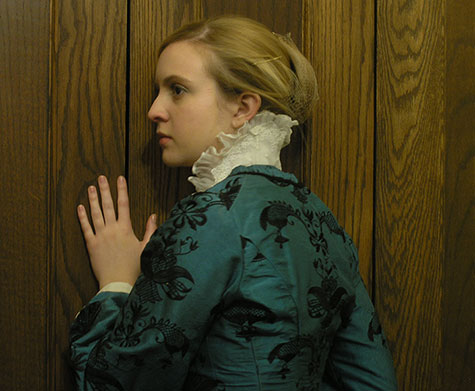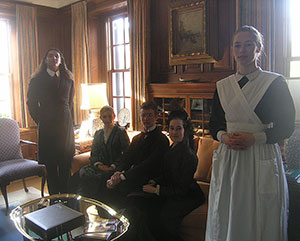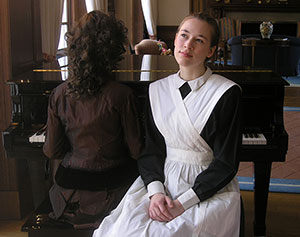
The light bulb. The phonograph. The sewing machine.
On this noble roster of pioneering electrical inventions belongs a plain wooden box, decorated with a few twisting knobs and attached to a bulbous device that, to modern eyes, vaguely suggests a hair dryer or a hand-held mixer.
“It looks like a farming instrument,” observes Mrs. Catherine Givings, wife of the Victorian gynecologist Dr. Givings.
But this is no farming instrument. This is science. This is medicine.
This is Sarah Ruhl’s In the Next Room (or the vibrator play), one of the most critically acclaimed comedies of recent years.
This month, Washington University in St. Louis’ Performing Arts Department in Arts & Sciences will present an all-new staging of Ruhl’s Pulitzer- and Tony-nominated work as its spring Mainstage production. Performances run April 19-28 in Edison Theatre.
“In the Next Room is a perfect university play,” says director Henry Schvey, professor of drama. “It interweaves thoughts and ideas from across the arts and sciences. It’s as much about psychology, medicine and the history of technology as it is gender studies.
“And of course, it’s also very, very funny.”
* Listen to an interview with Schvey here.

‘A couple of their time’
Set in upstate New York in the 1880s, In the Next Room opens with Catherine tending to her infant daughter, Letitia, while Dr. Givings prepares to meet a new patient.
Mrs. Daldry is frail and nervous and painfully sensitive to light and cold — afflictions that render her incapable of playing the piano or otherwise entertaining her husband.
“You have no idea what a source of anguish my wife’s illness has been to me,” complains Mr. Daldry. “And to her, of course.”
Givings diagnoses hysteria, likely due to a congestion of the womb. And so, with a hat-tip to Thomas Edison — “that great American” — the benevolent doctor prescribes a new electrical instrument capable of inducing paroxysms of release. “We shall be done in a matter of minutes,” he assures the nervous woman.
“Givings is an enthusiast, a man of science,” Schvey explains. “From a contemporary perspective, a diagnosis of hysteria is pure poppycock. But we don’t have the sense that he’s subliminally acting out his own desires. He’s basically an innocent. Women were not supposed to be sexual creatures.”
Schvey notes that the walls between the doctor’s office and his living room, where Catherine chats amiably with Mr. Daldry, make a neat allegory for the period’s gender divide.
“Dr. and Mrs. Givings are a couple of their time,” Schvey says. “They treat one another with a tremendous amount of formality, and Mrs. Givings knows nothing about what’s going on in the next room. But she has all this suppressed energy, and she becomes increasingly curious — and concerned.
“I think Ruhl raises very serious questions about technology,” Schvey adds. “Electricity is the means to a kind of liberation, but there’s also an implication that something is lost — an idea that I think has real resonance in an era of computers and cellphones.”
Still, at root, Schvey sees a love story.
“It’s like a Shakespearean comedy,” he concludes. “The vibrator becomes like the magical flower in A Midsummer Night’s Dream. It causes people to fall in love, and dissolves the walls between the sexes.
“In the end, it’s a celebration.”

Cast and crew
Leading the cast of seven are senior Pete Winfrey and sophomore Kiki Milner as Dr. and Mrs. Givings.
Senior Gaby Schneider is the midwife Annie. Senior Phoebe Richards is Mrs. Daldry, with St. Louis actor Jack Dryden as her husband.
Freshman Dana Robertson is Elizabeth, Letitia’s wet-nurse. Ricki Pettinato is Leo, an artist hoping to revive his flagging creativity.
Scenic and costume design are by Rob Morgan, senior lecturer in drama, and Bonnie Kruger, professor of the practice in drama. Sean Savoie is lighting designer and production manager. Props are by Emily Frei, and junior Simeng Zhu handles sound design.
Senior Melissa Freilich is assistant director. Freshman Alexander Booth is stage manager.
Medical exhibition
In conjunction with the play, the Becker Medical Library at the WUSTL School of Medicine will present In the Next Room: Medical Treatment of Women With ‘Hysteria.’ The exhibit examines the various ways this peculiar disorder was viewed in both a medical and a social context from the 16th to the late 19th centuries.
Included are five antique vibrators, dating from the early 1900s to the 1920s, on loan from the Center for Sex and Culture in San Francisco.
Tickets
Performances of In the Next Room (or the vibrator play) will begin at 8 p.m. Friday and Saturday, April 19 and 20, in Edison Theatre. In addition, there will be a special “midnight matinee” at midnight Saturday, April 20. Performances will continue the following weekend, at 8 p.m. Friday and Saturday, April 26 and 27; and at 2 p.m. Sunday, April 28.
Edison Theatre is located in the Mallinckrodt Center, 6445 Forsyth Blvd. Tickets are $15, or $10 for students, seniors and WUSTL faculty and staff. Tickets are available through the Edison Theatre Box Office, (314) 935-6543, and through all MetroTix outlets.
For more information, call (314) 935-6543 or visit padarts.wustl.edu.